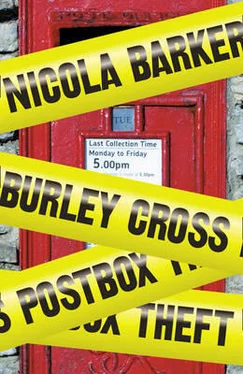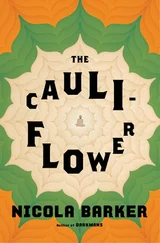Nick Endive now shot straight to the top of my list of suspects; his passionate but illicit declaration of love to Nina Springhill was, I reasoned, exactly the kind of confession a man might seriously live to regret…
Let me also just say, at this pertinent juncture, that I am not now (and never was) willing to follow the Thorndyke route and blame either Trevor Woods — BC’s long-suffering postman — or his employers at the Royal Mail for this illegal act (had they been truly determined to replace the postbox with a more modern version, I’m certain there would have been countless far less complicated ways for them to have facilitated this process). In fact, so far as I can tell, the only illegal act the directors of that particular organization can fairly be accused of is asset-stripping a perfectly good, ancient and honourable British institution, then blithely running it — with due government approval, nay, assistance, even — into the ground! (As you already know, Inspector, this is something of a pet subject of mine — and one that I’m always only too happy to get exercised about…)
Re option (3): if the thief/thieves hadn’t actually opened any of the remaining letters in the cache, I think we must, by necessity, deduce that the letter they wanted to get their greedy mitts on was — more than likely — subsequently identified, separated from the rest and rapidly disposed of (to behave otherwise would be illogical: why commit a crime and then cheerfully leave the reason for it behind you in the guise of a glaring piece of evidence?!
Love-lorn as Nick Endive obviously was, surely even he wouldn’t have been silly enough to dump a letter containing his innermost feelings in a bin bag behind the salon of one of Skipton’s most famous blabbermouths!).
Bearing all of the above in mind, the BCPBT investigation was now effectively stuck in neutral — facing a metaphorical ‘brick wall’ — because without fingerprints (which PC Hill was unable to acquire, due to the rain, and the necessary distraction of his delicious-sounding fish dinner) or a witness (of which there were none), we were left without any palpable clue as to the thief’s identity (and scant hope of acquiring any, either).
On this basis I decided (as you yourself had done before me) to make a study of the remaining letters in the cache to try and build up a picture of Burley Cross (as a crime scene/ community, on the week/night of the robbery), in the pathetic hope that there might be some subtle clues to this mystery inadvertently sewn into the everyday fabric — the insignificant weft and weave, so to speak — of other people’s lives.
I don’t doubt that we all found out rather more about this small, attractive, relatively well-to-do moor-side village than we had hoped (or, indeed, expected) by this subsequent course of action, Inspector, not least that Astrid Logan was planning to instigate yet another of her surreptitious ‘moonlight flits’ with that troublesome, and evasive, internet pal of hers.
Part of me regrets the fact that the force was unable to take any kind of decisive action in this regard (perhaps we might have posted the letter on, in the hope of setting up a trap and catching the filthy bugger, red-handed… But the timing — as you comment in your ‘further notes’ — was, of course, way too tight).
It later transpired that the contact address, alone, proved very useful. I’ve since been told (in subsequent conversations with the Portsmouth Constabulary) that Marc Pym’s home was raided (for a third time) in January and his computer confiscated, although little incriminating evidence was found on it (aside from a lengthy correspondence — mainly focusing on the subject of diet — and the contact addresses of forty-three underage girls, all of whom he had met on eating disorder websites as ‘Gabriel’, or in the form of his avatar, ‘Skinny Lad’, a nineteen-year-old boy suffering from chronic bulimia).
As we currently stand, the gentleman in question still remains ‘at large’.
A further codicil to this story: after you contacted Penelope and Angus McNeilly with the news about Astrid (and told them that they were at liberty to do with it what they would), I have been reliably informed that they immediately made contact with Mr Wolf (he being the one person whose reputation might, quite reasonably, have been perceived as being the most damaged by Astrid’s deception) and duly apologized to him on Astrid’s behalf. He subsequently insisted — being ever the gentleman — that the matter should remain strictly under wraps. He was much less concerned about his own social standing, it seems, than for Astrid’s long-term mental and physical well-being, especially in the light of her mother’s tragic death from cervical cancer at the start of the New Year.
(I don’t know why, but I have a nagging feeling that this won’t — by any stretch of the imagination — be the last we hear of this particular story, more’s the pity…)
But let’s get back to the real gist of the matter, now, shall we? Like I said before, there were many things I learned from my perusal of those twenty-six letters, Inspector (many things — enough to fill several notebooks, in fact), yet the piece of correspondence that drew me the most (the one that my eye kept on returning to, come what may), was the letter to Miss Squire (Miss Courtney Squire, ‘personal assistant’ to Mr Gerald Booth), from Mrs Brenda Goff (of Buckden House).
I have known Mrs Goff for many years, and she has never particularly struck me as the most forthcoming of women (it’s sometimes as much as I can do to elicit a grudging ‘Good morning’ out of her!), and yet here she was, the busy proprietress of an extremely successful bed and breakfast, committing the time and the effort to writing a letter (ten pages in length!) to someone she’d actually never met — someone with whom she’d previously enjoyed only the most rudimentary of telephone conversations.
This Miss Squire certainly must have a very successful and dynamic cold-calling technique, I mused, since not only had she clearly impressed Mrs Goff during this short, introductory chat of hers (to the extent that Mrs Goff was willing to offer her reduced rates on two rooms at hardly any notice), but she’d had what sounded like a similar kind of impact on Wincey at The Old Oak — and who can guess how many others in the local vicinity?
During her letter, Mrs Goff mentions, in passing, that Wincey had been told that Mr Booth (‘a practitioner of the Esoteric Sciences’) was ’the by-product of a secret tryst between a prominent individual from the Salvation Army dynasty and one of the legendary Trebors…’
Well, I don’t think it takes too much of a stretch of the imagination to work out which prominent individual from the Sally Army we are automatically meant to think of here: there surely can’t be many individuals more prominent than the Salvation Army’s founder: Sir William Booth, himself (the clue is in the name, I suppose). Although the connection’s never made completely explicit (how could it have been? As an illegitimate son, Mr Booth’s theoretical ancestor would have had no right to claim membership of the family).
But how about the Trebors? A little harder to pin down. I did some research on the internet and found myself unable to find out anything about this ‘legendary’ clan — to the extent that I have now begun to have serious doubts as to whether they even really exist (might Trebor not just be the name of the sweet company itself? Also, quite coincidentally, the name Robert, back to front?).
What I do know is that the company was formed in 1907, that the famous Trebor Extra Strong Mint was launched in 1935, that shortly afterwards they merged with Bassett’s (the Liquorice Allsorts people, formed by George Bassett in 1842) and then still later on with Cadbury’s Schweppes.
Читать дальше
Конец ознакомительного отрывка
Купить книгу












